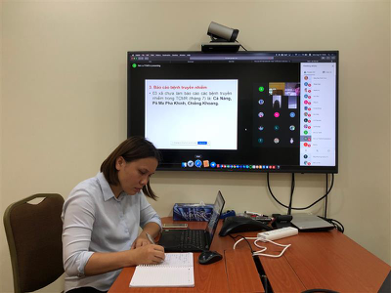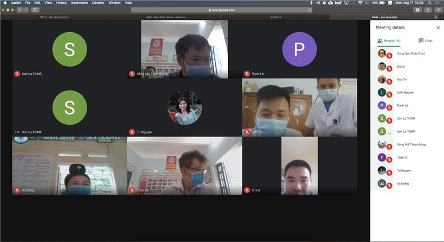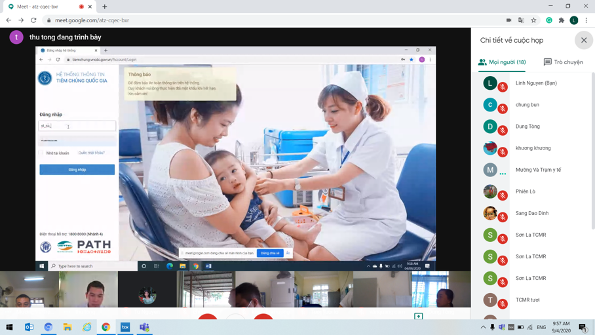Virtual supportive supervision – How to avoid Covid-19 disruption to the electronic immunization registry implementation in Vietnam
The typical week-long supportive supervision trip of national-level officers would entail two full days traveling between Hanoi and Son La province, and many hours and even days traveling from province center to district and communes on the winding and beaten-up local roads along the mountain slopes. Due to the time consuming of travel, together with the extensive cost for transportation and accommodation, many of these trips are combining supervision for multiple programs (immunization, family planning, TB program, nutrition, communicable disease prevention, and control, etc.). Regardless of the hustle and bustle to rush from one commune to the next, trips like these would cover an average of 8 to 12 communes in one district, several hospitals, and conclude with a review at Son La provincial CDC. Though, that is not sufficient for all immunization officers to get direct hands-on training, guidance, and troubleshooting – which might take up to a whole year to cover 204 commune health centers in Son La province. Since March 2020, Vietnam also has strictly and widely practiced social distancing in an effort to control the spread of Covid-19 in the community; thus, all the scheduled supportive supervision was delayed uncertain rescheduled timeline.
With the confidence of Vietnam's technical and political landscape - the widespread stable internet connection, the availability of computers/laptops/mobile devices, and the enthusiasm of the healthcare workers in Vietnam - that hosts the National Immunization Information System (NIIS) nationwide, PATH, under The Introducing Digital immunization Exchange And Learning from Vietnam (IDEAL Vietnam) project, has planned to utilize virtual supportive supervision for their capacity building of immunization officers. Literature review, cost analysis, as well as landscape assessment have supported its tremendous benefits, bridging the gap in time and geography to provide timely and efficient supportive supervision to all-level immunization officers on NIIS. Furthermore, for project implementation, frequent supportive supervision is also the chance for direct and constructive feedback to improve the system.
After consideration of multiple applications, Google Meet was selected as the free and most common platform that fits well with the existing Google ecosystem within the healthcare facilities. Standard Operation Procedure (SOP) for virtual supportive supervision was developed from planning, scheduling, preparation (technical equipment of computer, webcam, speakers, and background environment of space and sound, etc.), to actual conduction of the session (online etiquette and conducts, the function of screen sharing, chat, raise hands, questions, polls, etc.), and follow up afterward. Multiple training sessions for the immunization officers were arranged with step-by-step instructions for using the online platform, and direct interacting with the application.
The first few sessions went on with lots of giggling around the interrupted moving familiar faces, of distracting from loudspeakers' echo, popped-up phone rings, of talking over each other. It took 30 minutes for everyone to settle down. From then, district staff presented their slides to review overall the system and consolidate existing problems to discuss during the session; commune staff had the chance to ask questions, raise concerns, point out right on the screen live bugs and mistakes; national staff could answer questions, provide guidance, and take notes of the discrepancies in the system for future improvement. Information flow between different levels was never as transparent and direct. Communes could also exchange information and learn from each other. This new form of communication, exchange, and learning, though cannot replace the face-to-face supportive supervision trips, was well accepted, utilized as a preferred method from the tops central NEPI down to commune health centers, especially with urgent updates and timely concerns.
As the staff has gotten accustomed with the popping-up faces on the screen, Covid-19 second wave came back to Vietnam the end of July, 2020 with seemingly stronger virulence. Besides all the measures taken to respond to the outbreak, including social distance and mobility reduction, together with the human resource shortage who have to also focus on Covid-19 respond, immunization officers now are ready with alternative means to continue their important work uninterruptedly and efficiently. Virtual supportive supervision can still be conducted on schedule, and the NIIS utilization and quality can still be improved.
Capacity building in technological advancement is essentially "preparation for a rainy day."
PATH is a global organization that works to accelerate health equity by bringing together public institutions, businesses, social enterprises, and investors to solve the world's most pressing health challenges. With expertise in science, health, economics, technology, advocacy, and dozens of other specialties, PATH develops and scales solutions—including vaccines, drugs, devices, diagnostics, and innovative approaches to strengthening health systems worldwide. Learn more: at www.path.org.
For more information as well as publications on IDEAL Vietnam, please visit our landing page at https://www.technet-21.org/en/topics/ideal.



